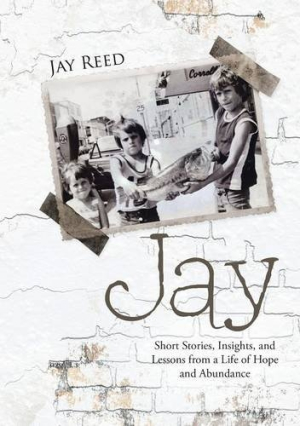Jay
Short Stories, Insights, and Lessons from a Life of Hope and Abundance
The real lesson of Jay is to cherish life’s small moments, and to remain on the lookout for the many flashes of beauty that surround us.
A Midwestern brand of self-effacement runs through Jay Reed’s eponymous photo memoir, Jay. In the acknowledgments, which he addresses to his mother, Reed writes, “We have enjoyed a life full of simple pleasures abundant with hope and love. Not bad so far, not bad at all.” Upon reading carefully drawn scenes from Reed’s bucolic upbringing and tales of his outdoor explorations, many would say his life has been not just “not bad,” but rather very good.
Reed’s aim with this memoir is to unearth the root of what he calls an “empty unsettled feeling of disconnection” that’s dogged him for much of his adult life. To find the answers he seeks, he considers his life chronologically in a series of short, rousing vignettes, augmented with photographs that give the book the feel of a family scrapbook. Reed covers everything from growing up in the seventies on Indiana farmland to climbing mountains in Wyoming to canoeing in the north woods of Ontario. The lessons of the subtitle are given in the form of aphorisms and brief reflections in the book’s final chapter.
Reed mentions in the acknowledgments and author bio that he’s a landscape photographer, which is no surprise. The book is rife with vivid visual details, like this description of playing in a stream near his childhood home:
It began as a tiny trickle the earth and rock dam could not hold back, and then a massive torrent of water was careening over trucks and buildings. The devastation was complete; we yelled and laughed in sheer delight as the army men, cars, and stick homes were washed down the creek.
While Reed skillfully observes the world around him, there is very little self-analysis in this memoir. Reed isn’t as interested in who’s behind the camera as in the colorful people and settings he depicts. This extends to his family. The book contains a great deal about kindhearted neighbors, but virtually no details about his parents or siblings. There are not only childhood difficulties, including a learning disability, but also his grandfather’s shocking suicide. These stories beg to be unfolded, but instead they’re included as near afterthoughts.
Despite the fantastic attention to detail, the book has an odd “out of time” quality, like a leaf pressed under glass. The book’s focus is so micro it fails to ground Reed’s life in a larger cultural or political context. When he mentions September 11 halfway through the book, it comes as something of a shock.
The real lesson of Jay is to cherish life’s small moments, and to remain on the lookout for the many flashes of beauty that surround us. “Life does not simply hand you these kinds of experiences,” Reed explains. “You must search for them.”
Outdoor enthusiasts and fans of inspirational works will love what’s here.
Reviewed by
Anitra Budd
Disclosure: This article is not an endorsement, but a review. The publisher of this book provided free copies of the book and paid a small fee to have their book reviewed by a professional reviewer. Foreword Reviews and Clarion Reviews make no guarantee that the publisher will receive a positive review. Foreword Magazine, Inc. is disclosing this in accordance with the Federal Trade Commission’s 16 CFR, Part 255.

